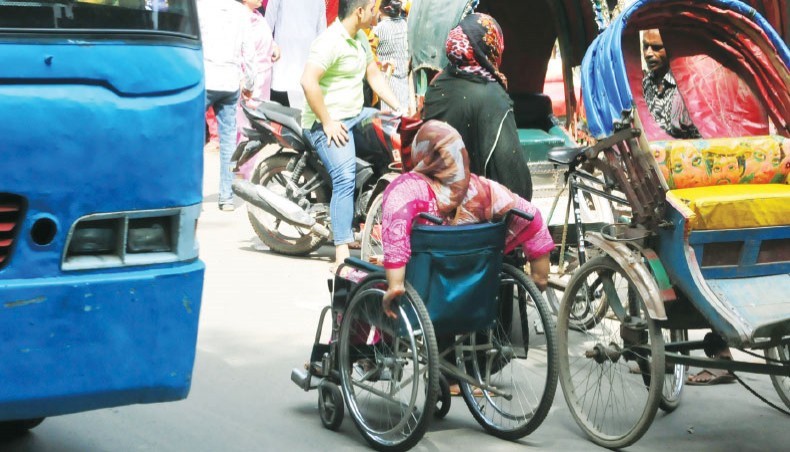Capital offers no facilities to physically challenged people
The capital provides no facilities to people with disabilities.
Rights groups said that the government took no interest to create disabled friendly facilities in the capital.
The disabled people find the capital’s footpaths, public transports, educational institutions, offices and even the hospitals quite inconvenient for their use.
Physically challenged people said that they feel neglected everywhere in the country.
The situation is no different elsewhere in the country.
Disabled people said that the whole atmosphere discourage them to get into mainstream of life.
Cinema halls and other recreation centres are equally unusable for them, they said.
The authorities are indifferent to development of special facilities for the disabled people in total disregard to the laws, rights groups told New Age.
They said the repeated demands for the development of special facilities for the disabled fell on the authorities’ deaf ears.
Wheel chair bound Eden College student Rounak Jahan Usha, doing her Master’s in sociology, had to appear in all her examinations at the college library as the exam hall was far from usable for her.
She finds the college washroom quite inconvenient for her use.
She can’t go to book stores at Nilkhet, though it’s at a stone throw from her college campus.
Rounak developed problems in her spine after she fell from the staircase in 2011.
She said she can’t go to restaurants or recreational centres with her friends who help her with her wheel chair.
She could not attend a single class in four years while she was studying for her honours as the sociology classes were held in the second floor.
The college authorities ignored her requests to take the classes in the ground floor saying that it could not be arranged as the sociology department was in the second floor.
Rounak said that she can’t use the footpath which runs from the gate of her college unless someone helps as it has no ramps.
Rounak can’t even imagine of commuting on buses as they use no ramps for the disabled.
She said that on one or two occasions when she tried to get into buses they deliberately sped away.
Recently, she said that being on wheel chair she could not access several blocks of BSMMU Hospital where she had been for check up.
During vacations she spends time along in the college hostel as most of her friends leave for homes in the countryside.
When asked Rounak said that she would appeal to the government to make it mandatory for all the busses to carry ramps for the disabled.
Women with Disabilities Development Foundation executive director Ashrafun Nahar Misti, said no owner makes residential buildings accessible to everyone as the Dhaka Metropolitan Building Rule 2008 requires.
Ashrafun Nahar who became wheelchair bound since falling from the rooftop in 1992 said that people like her find rented accommodations, offices and parking lots very inconvenient for use.
She said that on June 8, following demand from the rights groups, finance minister AMA Muhit requested the concerned ministries to make trains, buses, ferries, launches and the roads, footpaths and other public facilities user friendly to the disabled people.
In separate letters, Muhith conveyed the request to the the ministries of road transport and bridges, railways, shipping, home affairs and social welfare.
Not a single ministry could tell the rights groups what they received Muhith’s request.
Work for A Better Bangladesh Trust assistant project officer Rifat Pasha said that blind people can get into buses only at counters.
Rifat, who did his honours and Masters in international relations from Dhaka University though he lost his sight while studying in Class IV, said, ‘Everyone expect us to move and work like people having no handicaps.’
‘Footpaths in our capital can’t be used by physically challenged people as they are under unauthorized occupation,’ said rights campaigners.
Due to various obstacles, wheelchair bound people find it impossible to move between BIRDEM and BSMMU, following doctors’ advice.
A study by Work for Better Bangladesh Trust shows that Bangabandhu Sheikh Mujibur Rahman Hall, Surja Sen Hall, Jagannath Hall and Kabi Jasimuddin Hall of Dhaka University cannot be accessed by wheelchair bund students.
The government is neither serious nor sincere about the advancement of people with disabilities, said Bangladesh Protibandhi Kalyan Somity executive director MA Sattar Dulal.
Recently the roads and highways division provided ‘some portable ramps at BRTC depots in the capital, RHD secretary MAN Siddique told New Age replying to whether anything was done for the disabled since Muhith’s request.
Portable ramps have been made available for the BRTC’s disabled passengers travelling on long routes, he said.
He said, no other facilities could be provided for the disabled until now.
Local government division additional secretary Jyotirmay Dutta said that the capital’s two city corporations and Rajuk had been instructed to provide facilities for the disabled whenever they construct footpaths, roads and buildings.
According to the population census 2011, only 1.41 per cent of Bangladesh’s total population are disabled.
A Household Income Expenditure Survey conducted by the Bangladesh Bureau of Statistics in 2010 shows that 9.01 per cent of the country’s population are disabled.
Yet another BBS study done in 2015 shows that 1.51 per cent of the country’s population are disabled.
News Courtesy: www.newagebd.net











